
Journal of Derivatives
Scope & Guideline
Empowering Researchers with Cutting-Edge Findings.
Introduction
Aims and Scopes
- Advanced Derivative Pricing Techniques:
The journal emphasizes the development of sophisticated models for pricing various types of derivatives, including American and European options, swaptions, and exotic options. Research often involves semi-analytical methods, stochastic volatility models, and jump-diffusion processes. - Risk Management Strategies:
A significant portion of the journal's content is dedicated to exploring risk management techniques using derivatives. This includes studies on hedging strategies, the impact of transaction costs, and the implications of derivatives on portfolio management. - Market Behavior and Volatility Analysis:
The journal investigates the dynamics of financial markets, focusing on volatility modeling and the behavior of implied and realized volatility. It includes research on volatility skew, smile effects, and the implications of these factors for trading strategies. - Regulatory and Practical Implications:
Research published in the journal often addresses the regulatory environment surrounding derivatives, including discussions on LIBOR reform, SOFR transition challenges, and the implications for market participants. This practical perspective helps to bridge theory and real-world application. - Innovative Applications of Derivatives:
The journal encourages studies on the innovative use of derivatives in various contexts, such as asset management, commodity markets, and the integration of derivatives in risk capital requirements.
Trending and Emerging
- Volatility Dynamics and Modeling:
Recent publications highlight a growing focus on advanced volatility modeling techniques, including the use of machine learning and stochastic processes. This trend is driven by the increasing importance of accurately forecasting volatility in trading and risk management. - Integration of Machine Learning in Derivative Pricing:
There is a notable increase in research that explores the application of machine learning algorithms to improve derivative pricing and risk assessment. This reflects a broader trend in finance towards harnessing big data and computational techniques. - Impact of Regulatory Changes on Derivatives Markets:
With ongoing changes in financial regulations, such as the transition from LIBOR to SOFR, research addressing the implications of these changes on derivative pricing and market behavior has surged. This theme is crucial for practitioners navigating the evolving landscape. - Cross-Asset Derivative Strategies:
Emerging studies are increasingly focusing on multi-asset derivative strategies, exploring how different asset classes interact and impact derivative pricing. This trend suggests a shift towards a more holistic understanding of derivatives in diverse market contexts. - Behavioral Finance Aspects in Derivative Trading:
Recent publications indicate a rising interest in the behavioral finance aspects of derivative trading, particularly how psychological factors influence market dynamics and trader decisions. This theme is gaining traction as researchers seek to understand market anomalies.
Declining or Waning
- Historical Perspectives on Derivatives:
Research that provides historical analysis of derivatives and their impacts, such as discussions on past financial crises and their relationship to derivatives, has been less frequent. This decline may indicate a shift towards more contemporary and practical applications of derivatives. - Basic Pricing Models:
There appears to be a waning interest in foundational models like the Black-Scholes-Merton framework, as researchers increasingly focus on more complex, context-specific models that address the limitations of classical approaches. - Generalized Hedging Strategies:
While specific hedging strategies remain popular, broader discussions on generalized hedging approaches have diminished. This could suggest a trend towards more specialized or innovative hedging techniques tailored to specific market conditions. - Theoretical Derivative Concepts:
Research that delves into purely theoretical constructs without practical applications has seen a decline. The journal seems to favor studies that combine theoretical insights with empirical evidence or practical applications.
Similar Journals
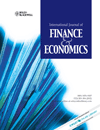
INTERNATIONAL JOURNAL OF FINANCE & ECONOMICS
Innovative Perspectives on Finance & EconomicsInternational Journal of Finance & Economics, published by Wiley, is a premier academic journal that serves as a vital resource for researchers and professionals in the fields of finance, accounting, and economics. With an impressive impact factor and a reputation for excellence, the journal is recognized in the 2023 Scopus rankings, placing in the top quartiles across multiple categories, including Q2 in Accounting, Economics, and Finance. The journal has been a significant contributor to academic discourse since its inception in 1996, with its converged years extending to 2024, thereby ensuring the continuous advancement of knowledge in these critical areas. Although it operates under a traditional subscription model, its comprehensive articles provide insightful analyses, empirical research, and theoretical advancements that cater to a diverse audience—from seasoned scholars to emerging students in the field.
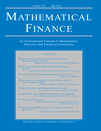
MATHEMATICAL FINANCE
Cultivating Insights in Mathematical FinanceMATHEMATICAL FINANCE is a prestigious journal published by Wiley, focusing on the interdisciplinary fields of finance, applied mathematics, accounting, and economics. With its ISSN 0960-1627 and E-ISSN 1467-9965, this journal has earned its place in the top tier of academic publications, reflected by its Q1 rankings across multiple categories in 2023, including Accounting, Applied Mathematics, Economics and Econometrics, Finance, and Social Sciences. MATHEMATICAL FINANCE, which commenced publishing in 1991, is recognized for its rigorous peer-review process and its significant contribution to the advancement of knowledge in quantitative finance methodologies and risk management practices. Although it does not currently offer open access, the journal remains an invaluable resource for researchers, professionals, and students seeking to stay abreast of the latest theoretical advancements and empirical studies in mathematical finance. Its impact factor and Scopus rankings further illustrate its high standing within the academic community, making it an essential platform for impactful research and scholarly discourse.
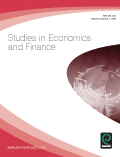
Studies in Economics and Finance
Uncovering insights for a complex financial world.Studies in Economics and Finance is a distinguished journal published by Emerald Group Publishing Ltd, based in the United Kingdom. With an ISSN of 1086-7376 and an E-ISSN of 1755-6791, this journal has been a significant contributor to the fields of economics, econometrics, and finance since its inception, with coverage ranging from 1977 to the present. Ranked in the second quartile (Q2) for 2023 in its relevant categories, it holds a reputable position within the 83rd percentile in the general economics, econometrics, and finance fields according to Scopus rankings. This journal aims to disseminate cutting-edge research that addresses key issues and emerging trends in the economic and financial landscapes, fostering dialogue among scholars, practitioners, and policymakers. Although it does not operate under an Open Access model, Studies in Economics and Finance continues to be an essential resource for advancing knowledge and providing insights that are crucial for understanding complex economic behaviors and financial systems.
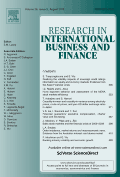
Research in International Business and Finance
Navigating the complexities of global financial systems.Research in International Business and Finance is a premier academic journal published by ELSEVIER, dedicated to advancing the field of international business and finance through high-quality research dissemination. With its ISSN 0275-5319 and E-ISSN 1878-3384, this journal stands out in the international research community, boasting an impressive Q1 ranking in both the Business, Management and Accounting and Finance categories for 2023. The journal aims to stimulate insightful discussions and provide a platform for innovative theories and practices from global perspectives, emphasizing empirical research and critical analysis. As it converges towards 2025, it continues to hold a prominent position in its fields, currently ranking #8 out of 189 in Business and #18 out of 317 in Finance according to Scopus. Although it does not offer open access options, the journal’s rigorous peer-review process ensures that only the most impactful research is published, making it an essential resource for researchers, professionals, and students striving for excellence in international business and finance.
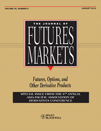
JOURNAL OF FUTURES MARKETS
Navigating the Complexities of Future MarketsThe JOURNAL OF FUTURES MARKETS, published by WILEY, stands at the forefront of research in the fields of accounting, economics, finance, and business management. With an ISSN of 0270-7314 and E-ISSN 1096-9934, the journal has been a key academic resource since its inception in 1981, with content converging up to 2024. It is recognized for its rigorous peer-review process and maintains a strong presence in the academic community, holding a Q2 ranking in multiple categories such as accounting and finance, according to the latest 2023 evaluations. With a reputable Scopus ranking, where it ranks in the 65th percentile for economics and econometrics, this journal is essential reading for researchers, professionals, and students alike who seek to explore the complexities of future markets. While not an open-access publication, it offers various subscription options that make cutting-edge research accessible to a broad audience, fostering a deeper understanding of market dynamics and trends.

Journal of Risk
Fostering Dialogue on Risk in Today’s EnvironmentJournal of Risk, published by INCISIVE MEDIA, serves as an essential platform for scholars and practitioners in the fields of finance and strategic management. With an ISSN of 1465-1211 and an E-ISSN of 1755-2842, this journal explores the multifaceted nature of risk, encompassing theoretical frameworks, empirical investigations, and practical applications. Although currently classified in Q4 for both Finance and Strategy and Management categories as per 2023 standards, it provides a crucial forum for innovative research and thought leadership, addressing the challenges faced in understanding and managing risk in today’s dynamic environment. The journal, based in the United States, is committed to advancing knowledge and offering a platform for debate and dialogue in its convergence years from 2011 to 2024. Researchers, professionals, and students are encouraged to contribute their insights to enhance the academic discourse surrounding risk management.

SIAM Journal on Financial Mathematics
Transforming Financial Challenges into Mathematical SolutionsThe SIAM Journal on Financial Mathematics, published by SIAM PUBLICATIONS, is a premier journal dedicated to the intersection of applied mathematics and finance. With an ISSN of 1945-497X, this journal serves as a vital platform for the dissemination of innovative research that addresses complex financial problems through mathematical modeling and analytical techniques. The journal has established itself within the Q2 quartile in the categories of Applied Mathematics, Finance, and Numerical Analysis, reflecting its influence and significance in these fields. Researchers and practitioners will find a wealth of knowledge spanning topics from stochastic calculus to quantitative finance, making it essential for anyone aiming to advance their understanding of financial mathematics. As the journal continues to converge from 2010 to 2024, it promises to remain a cornerstone resource for academics, professionals, and students alike, facilitating the ongoing dialogue between mathematics and its applications in the financial industry.
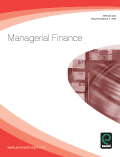
MANAGERIAL FINANCE
Empowering Research in Finance and Management.MANAGERIAL FINANCE is a prestigious academic journal published by Emerald Group Publishing Ltd, focused on the areas of finance, management, and strategy. With an ISSN of 0307-4358 and an E-ISSN of 1758-7743, this journal has carved a niche for itself within the business and financial sectors, achieving a commendable Q2 category ranking across multiple domains, including Business, Management and Accounting, Finance, and Strategy and Management, as of 2023. The journal aims to provide a platform for insightful research and critical analysis while fostering an understanding of contemporary financial practices and theories. With its wide-ranging scope, it serves as a vital resource for researchers, professionals, and students alike, looking to stay abreast of the latest trends and challenges in managerial finance. The editorial board is committed to maintaining academic rigor, ensuring that articles published are of the highest quality and relevance to the field. By bridging the gap between theory and practice, MANAGERIAL FINANCE is an essential reference for anyone involved in financial decision-making and strategic management.
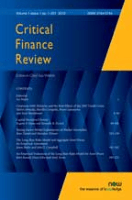
Critical Finance Review
Shaping the future of finance through high-quality research.Critical Finance Review is a premier academic journal dedicated to advancing the field of finance through the publication of high-quality research that spans various dimensions of the discipline. Published by NOW PUBLISHERS INC, this journal has quickly established itself as a leading source of innovative finance scholarship, achieving a notable Q1 classification in the 2023 finance category. Operating under a rigorous peer-review process, the journal ensures the academic integrity and relevance of its content, which attracts contributions from both emerging and established scholars. With an ISSN of 2164-5744 and E-ISSN 2164-5760, it is accessible to a global audience, though it operates under traditional access models. The journal welcomes a diverse range of topics including, but not limited to, risk management, financial markets, and quantitative finance, making it an essential resource for researchers, professionals, and students who are keen to explore the complexities of financial systems and develop new insights in the ever-evolving landscape of finance. Based in the United States, Critical Finance Review holds a significant position within the academic community, fostering a collaborative environment that encourages innovative thinking and practical applications of financial theories.

Algorithmic Finance
Bridging Theory and Practice in Algorithmic FinanceAlgorithmic Finance, published by IOS PRESS, is a pivotal journal devoted to the burgeoning field of finance through the lens of computational methodologies. With its ISSN 2158-5571 and E-ISSN 2157-6203, the journal has been a platform for scholarly articles exploring the intricate interactions between algorithms and financial systems since its establishment in 2011. Although it currently resides in the Q4 quartile across several categories, including Computational Mathematics and Finance, it serves as a critical resource for researchers seeking to innovate within the financial landscape using algorithmic techniques. The journal is particularly relevant for an audience of academics, finance professionals, and graduate students, providing insights that combine quantitative analysis with economic theory. Located in Amsterdam, Netherlands, Algorithmic Finance aims to foster an interdisciplinary dialogue, making significant strides in the analytical approaches to financial markets while adhering to rigorous scientific standards. With its growing archive of research, the journal aspires to enhance the understanding of algorithmic strategies in finance, thereby encouraging further inquiry and application in real-world scenarios.